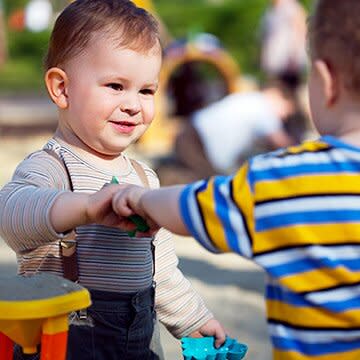Developing Language and Social Skills

iStock
Introduction
Although infants may stare at and touch each other, the year from age 2 to 3 is when true social skills, albeit tentative ones, emerge. This early sociability may not be readily apparent, however.
If your newly turned 2-year-old takes part in regular playdates, he may seem barely to notice the other children involved -- except, perhaps, when someone grabs his toy. That's because most socializing is still parallel play, in which children play next to, but not really with, each other.
Sharing also remains difficult. The concepts of me and mine are linked closely to the toddler's blossoming sense of self, so conflicts over toys and other possessions among 2-year-olds are inevitable. Biting, hitting, and pushing are some of the unpleasant but likely consequences, and "No, mine!" is an often-heard protest. As the year goes on, however, your child will begin to interact more cooperatively. Older toddlers start to use their burgeoning imaginations to role-play together, creating brief tea parties or superhero escapades.
But even when play seems primitive or fraught with conflict, you shouldn't underestimate the importance of your 2-year-old's peer contacts. Research shows that children as young as 20 months begin to form relationships. They clearly prefer to play with certain friends, and the main object of their affection usually reciprocates.
Page 2
By now your child probably knows about 300 words. She may not be able to use them all, but she understands their meaning. As language skills zoom skyward, most 2-year-olds revel in their new capabilities and chatter nonstop, much to the entertainment of Mom and Dad. Sentences rapidly lengthen from rudimentary two- or three-word utterances at the beginning of the year to more complicated constructions, complete with pronouns, prepositions, and articles, as your child approaches the age of 3.
The word "I" may not enter your child's vocabulary until she's 2 1/2 or older. And although it's natural for you to want to correct the many grammatical mistakes she will make now, it's important to refrain from doing so. Too much correcting will undermine her confidence; instead, model appropriate use of language so that your child hears for herself what's right.
While language skills at this age are significant, most of the information your child takes in still comes from her primary senses-touch, sight, hearing, taste, and smell. She's constantly seeking new experiences to understand the world around her better, so it's important to provide her with a stimulating and safe play environment.
Attention span lengthens this year, and many more sophisticated concepts are within the 2-year-old's grasp. Some, however, such as the difference between animate and inanimate objects, may elude him. "Bye-bye, swings. Bye-bye, slide," your child may say upon leaving the playground.
Another capacity that expands this year is sense of humor. The knee-slappers that send a 2-year-old into gales of laughter may not seem particularly funny to adults, but the child's reaction surely will. He'll begin to find incongruities highly amusing, announcing, for instance, "I'm going to eat a fire truck for breakfast!" and then convulsing with laughter.
All content here, including advice from doctors and other health professionals, should be considered as opinion only. Always seek the direct advice of your own doctor in connection with any questions or issues you may have regarding your own health or the health of others.